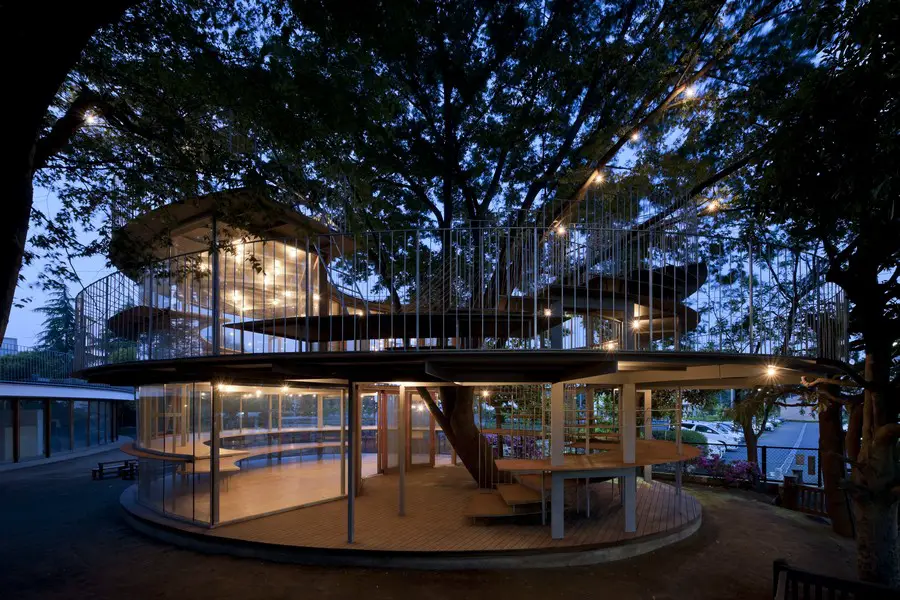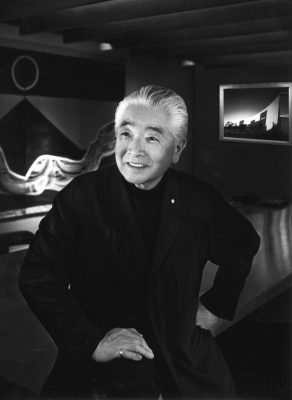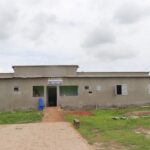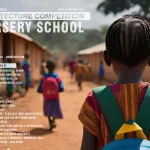2017 Moriyama RAIC International Prize Shortlist, Canada Architecture Competition, Buildings
2017 Moriyama RAIC International Prize
Canadian Architecture Design Competition – organised by The Royal Architectural Institute of Canada (RAIC) Foundation
20 Sep 2017
2017 Moriyama RAIC International Prize Winner
Organisers: The Royal Architectural Institute of Canada Foundation
2017 Moriyama RAIC International Prize Winner
TEZUKA ARCHITECTS WINS 2017 MORIYAMA RAIC INTERNATIONAL $100,000 (CAD) PRIZE FOR EXCELLENCE IN ARCHITECTURE
TORONTO, ON (September 20, 2017) – The Royal Architectural Institute of Canada (RAIC) is pleased to announce Tokyo-based Tezuka Architects‘ Fuji Kindergarten as the winner of the 2017 Moriyama RAIC International Prize.
The Prize winner was revealed on September 19, 2017, during an awards ceremony and gala at the historic Carlu in Toronto, attended by about 250 members of the Canadian and international architecture community.
Fuji Kindergarten building in Tokyo by Tezuka Architects:
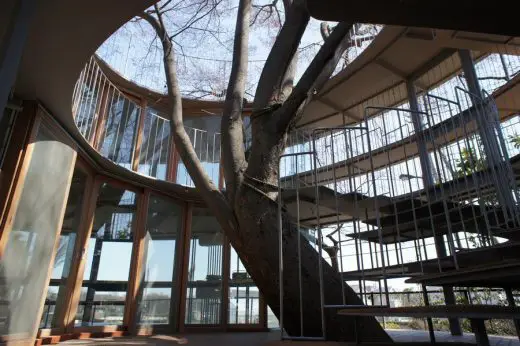
photograph : Katsuhisa Kida/FOTOTECA
“I feel now there is someone who understands this project well. I think it’s quite a unique prize because it’s about contributing to society,” comments the 2017 Moriyama RAIC International Prize winner, Takaharu Tezuka of Tezuka Architects. “It looks like a simple structure. But it’s a layering of many ideas combined.”
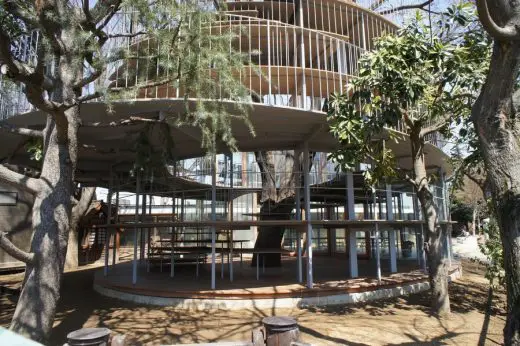
photograph : Katsuhisa Kida/FOTOTECA
Tezuka Architects’ Fuji Kindergarten in Tokyo, Japan, was selected by the seven-member jury following site visits to each of the four shortlisted projects. In addition to the Fuji Kindergarten, the finalists include 8 House in Copenhagen, Denmark, by Bjarke Ingels Group; the Melbourne School of Design in Melbourne, Australia, by John Wardle Architects and NADAAA; and the Shobac Campus in Nova Scotia, Canada, by MacKay-Lyons Sweetapple Architects. The Prize received submissions from 17 countries across six continents.
Fuji Kindergarten, Tokyo, Japan by Tezuka Architects:
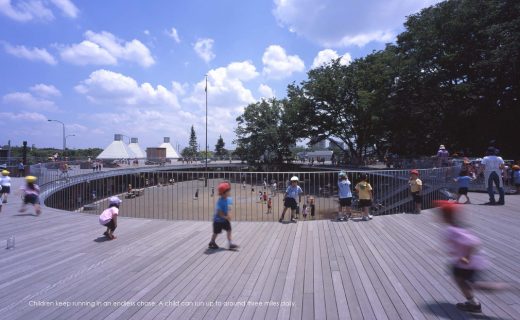
photo : Kida
“It is a pleasure to congratulate the winner of the second Moriyama RAIC International Prize and to recognize their devotion to architecture that imagines new possibilities for people,” said Raymond Moriyama, CC, O.Ont., FRAIC.
“This is a prize that will continue to acknowledge the important work of transformative architecture worldwide and its designers,” said Moriyama. “No matter the scale or size of the building, the Prize provides an opportunity to recognize design qualities which make a positive contribution. Society is evolving, we hope, toward more equality and social justice. Architects can provide leadership by creating inspiring buildings in service to a community.”
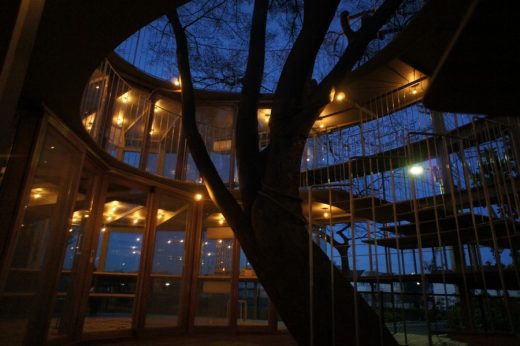
photograph : Katsuhisa Kida/FOTOTECA
Moriyama added: “The four projects shortlisted are all special. Their designers have done extraordinary work, and I can see the passion, intelligence, heart, and hard work which went into them.”
“What perhaps sets the Fuji Kindergarten apart is the sheer joy that is palpable in this architecture,” said Barry Johns, FRAIC, Jury Chair and a Trustee of the RAIC Foundation. “It is one of those rare buildings—comprised of a geometric plan, a single section, a roof, and a tree—that in their utter simplicity and unfettered logic magically transcend the normal experience of learning. This winning project should give all architects around the world reason for great optimism that humanity benefits enormously from the creation of such a deeply simple and yet sophisticated architecture of unquestionable redeeming value.”
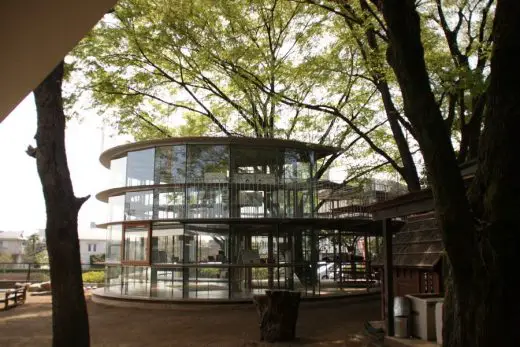
photo : Katsuhisa Kida/FOTOTECA
“This prestigious prize gives voice and attention to meaningful Canadian shared values such as openness, respect, compassion, equality, and justice,” said Michael Cox, RAIC First Vice-President. “These qualities are what make architecture a real force in light of the many crucial environmental and social issues that challenge contemporary society.
“Each of the shortlisted projects is unique and original,” said Cox. “They are very much about an architecture that accomplishes a social mission as it encourages interaction among residents, students, or schoolchildren. These projects create a framework for people’s lives.”
The Prize, which was established in 2014 by Canadian architect Raymond Moriyama along with the RAIC and the RAIC Foundation, consists of a monetary award of CAD $100,000 and a sculpture designed by Canadian designer Wei Yew. It celebrates a single work of architecture that is judged to be transformative within its societal context and reflects Moriyama’s conviction that great architecture transforms society by promoting social justice and humanistic values of respect and inclusiveness. Awarded every two years, the Prize is open to all architects, irrespective of nationality and location, and the winner is selected in an open, juried competition.
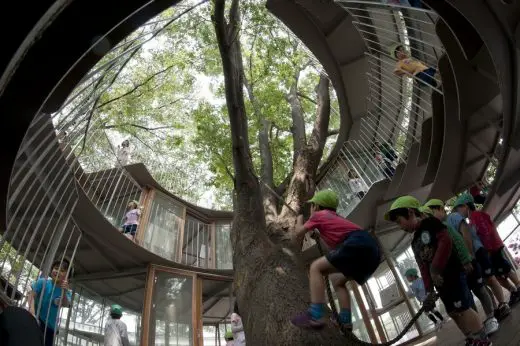
photograph : Katsuhisa Kida/FOTOTECA
Located in Tokyo, Japan, since 2007, the Fuji Kindergarten is a one-story, oval-shaped kindergarten that can accommodate over 600 children running freely around its open-air roof.
The building is designed to support the Montessori education method, which encourages independence, and for a climate that allows the children to be outdoors much of the year. The elliptical building, which houses classrooms, offices, and support spaces, surrounds an open playground that serves as the visual, functional, and spiritual focus of the school. The place for play is augmented by an elliptical upper deck that overlooks the playground and forms the roof of the school building. The rooftop itself becomes the play equipment for the children, some of whom run up to six kilometers a day.
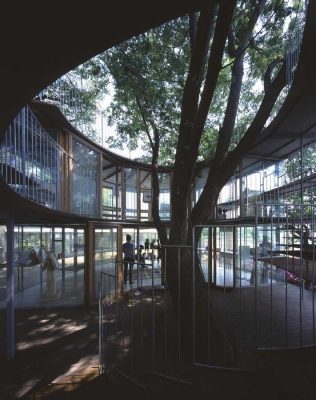
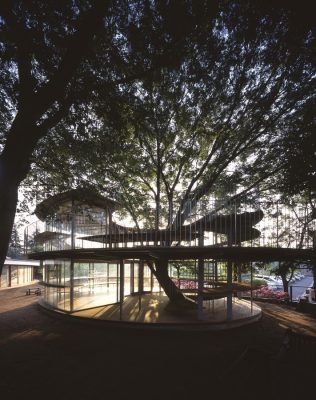
photo : Katsuhisa Kida/FOTOTECA
The classrooms and offices are open and defined only by partial-height partitions. Segmented sliding-glass walls permit a free flow of children and adults between inside and outside. The principal reports that the school’s approach encourages calmness and focus, including in children with behavioral disorders.
“What we want to teach through this building are values of human society that are unchanging, even across eras,” said Tezuka Architects in their submission statement. “We want the children raised here to grow into people who do not exclude anything or anyone. The key to Fuji Kindergarten was to design spaces as very open environments, filled with background noise. When the boundary disappears, the constraints disappear. Children need to be treated as a part of the natural environment.”
Three pre-existing Japanese zelkova trees were incorporated into the design of the school, emerging through the structure for children to climb on. The openings are protected by heavy nets, creating a soft cover on which the children can play, and through which they can look to the tree trunks and playground below. The architectural details were designed at the scale of a child, from the handrail to the door fittings and the size of the nets around the trees. Skylights, stairs, and a slide form close connections between the two levels of play.
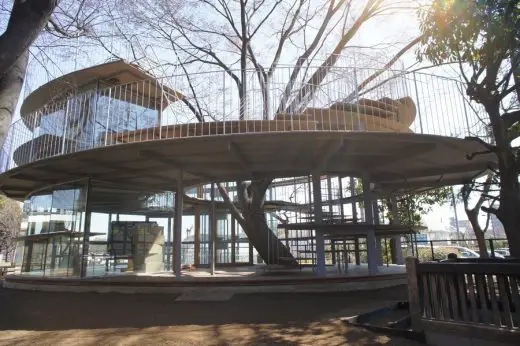
picture : Katsuhisa Kida/FOTOTECA
“The space by Tezuka Architects took a new look at kindergartens,” said the jury. “There is no hierarchy to the place; the teachers and the kids all have an equal status architecturally, which is a direct result of the form and the way the whole building opens up. It is an egalitarian, comfortable, and physically stimulating place for children.”
The jury noted: “The Fuji Kindergarten demonstrates that architecture can profoundly enhance lives through understanding the cultural needs of the day, and responding through intellectual exploration and manifestation through the craft of architecture. This is an extraordinarily positive place—a giant playhouse filled with joy and energy, scaled to a broad range of the human condition.”
The jury for the 2017 Moriyama RAIC International Prize consists of:
• Monica Adair, MRAIC: Co-founder of Acre Architects and 2015 Recipient of the RAIC Young Architect Award.
• Manon Asselin, MRAIC: Co-founder of Atelier TAG and Associate Professor of Architecture at the University of Montreal.
• Bryan Avery, MBE: Founder of Avery Associates Architects, author, and lecturer. Deceased July 4, 2017.
• George Baird, FRAIC: Founding Principal of Baird Sampson Neuert Architects; former Dean of the John H. Daniels Faculty of Architecture, Landscape, and Design at the University of Toronto; and 2010 Recipient of the RAIC Gold Medal.
• Peter Cardew, FRAIC: Founder of Peter Cardew Architects and 2012 Recipient of the RAIC Gold Medal.
• Barry Johns, FRAIC: Jury Chair and member of the RAIC Foundation.
• Li Xiaodong, Hon. FAIA: Winner of the inaugural Moriyama RAIC International Prize.
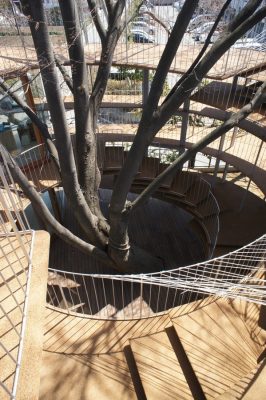
photo : Katsuhisa Kida/FOTOTECA
David Covo, FRAIC, Associate Professor of Architecture at McGill University, served as Professional Advisor to the jury.
In addition to the main CAD $100,000 prize, three scholarships of CAD $5,000 were awarded yesterday evening to students of Canadian schools of architecture, on the basis of a written essay on the topic: “The moment when you decided to become an architect.” The winners are Osman Bari, University of Waterloo; Alykhan Neky, Ryerson University; and Tanya Southcott, McGill University.
“The student scholarships are equally important to raise the aspirations of up-and-coming architects,” said Moriyama. “I congratulate the three winners and wish them well in their pursuit of architecture as a worthy profession.”
For more information on the 2017 Moriyama RAIC International Prize, please visit: https://moriyama.raic.org/.
11 Aug 2017
2017 Moriyama RAIC International Prize Shortlist
Organisers: The Royal Architectural Institute of Canada (RAIC) Foundation
2017 Moriyama RAIC International Prize Gala
September 19 gala will reveal Moriyama RAIC International Prize winner
OTTAWA, August 10, 2017 – The winner of the $100,000 Moriyama RAIC International Prize will be announced at a gala ceremony to honour the finalists from Denmark, Japan, Australia and Canada on Tuesday, September 19, in Toronto.
8 House, Copenhagen, Denmark by BIG Architects | Bjarke Ingels Group
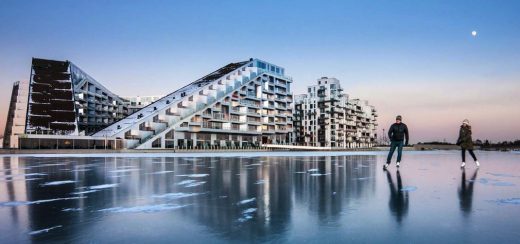
photo : Bjarne Tulinius
Fuji Kindergarten, Tokyo, Japan by Tezuka Architects

photo : Kida
Melbourne School of Design, University of Melbourne, Melbourne, Australia by John Wardle Architects and NADAAA
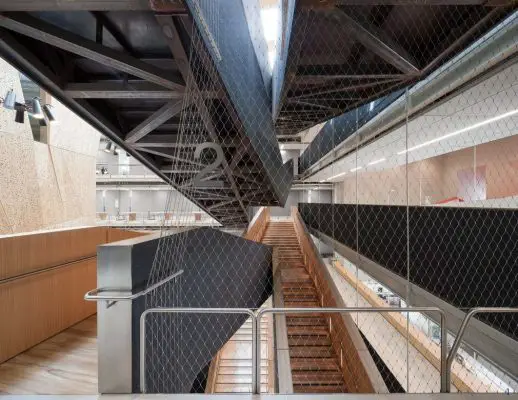
photo : John Horner
The Village Architect Shobac Campus, Upper Kingsburg, Nova Scotia, Canada by MacKay-Lyons Sweetapple Architects
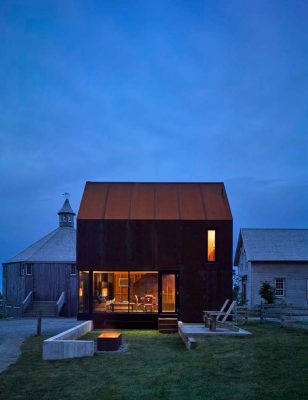
photo : James Brittain
Tickets are available now at http://moriyama.raic.org/gala. The cost is $500 for TWO tickets or $2,000 for a table of eight and includes a cocktail reception, sit-down dinner and prize ceremony. A portion is tax deductible. Benefits of the gala will support the Moriyama RAIC International Prize, a unique prize that puts Canada on the world stage, and the Moriyama RAIC International Prize Scholarships. All are welcome.
The gala is an exciting event celebrating the exceptional contribution architecture can make to a community. Architects and industry professionals from across the country and around the world will come together at the historic event space in downtown Toronto, The Carlu. This spectacular example of Art Moderne architecture is located at 444 Yonge Street, 7th Floor.
Site visits by the jury to the four projects shortlisted for the 2017 Moriyama RAIC International Prize in Architecture have been carried out, and the jury has completed its deliberations.
Neither the public nor the winner will be notified of the results until the announcement at the awards ceremony.
The four 2017 Moriyama RAIC International Prize finalists have been chosen based on how their projects embody the values of social justice, respect, and inclusiveness. They are:
- 8 House, Copenhagen, Denmark, Bjarke Ingels Group (BIG);
- Fuji Kindergarten, Tokyo, Japan, Tezuka Architects;
- Melbourne School of Design, University of Melbourne, Melbourne, Australia, John Wardle Architects and NADAAA;
- The Village Architect, Shobac Campus, Upper Kingsburg, Nova Scotia, Canada, MacKay-Lyons Sweetapple Architects.
In addition to the main CAD $100,000 prize, three scholarships of $5,000 each will be awarded to three students of Canadian schools of architecture on the basis of a written essay. They are:
- Osman Bari, University of Waterloo;
- Alykhan Neky, Ryerson University;
- Tanya Southcott, McGill University.
About the RAIC
The Royal Architectural Institute of Canada is the leading voice for excellence in the built environment in Canada. Representing about 5,000 members, the RAIC advocates for excellence, works to demonstrate how design enhances the quality of life and promotes responsible architecture in addressing important issues of society.
About the Moriyama RAIC International Prize
Raymond Moriyama, FRAIC, the Royal Architectural Institute of Canada (RAIC) and the RAIC Foundation created the Moriyama RAIC International Prize in 2014 to raise the international stature of the RAIC and the Canadian architectural profession, and to encourage Canadian architects to aspire to international excellence.
The Moriyama RAIC International Prize is awarded every two years. It consists of a monetary award of CAD $100,000 and a handcrafted sculpture designed by Canadian designer Wei Yew.
The prize is awarded to an architect, team of architects, or architect-led collaboration, based anywhere in the world, in recognition of a single work of architecture that is judged to be transformative within its societal context and expressive of the humanistic values of justice, respect, equality and inclusiveness.
In the words of Ray Moriyama, the intent of the award program is to “awaken ideas and thoughts that will alter our collective aspiration for the future of humanity.”
29 May 2017
2017 Moriyama RAIC International Prize Shortlist
Organisers: The Royal Architectural Institute of Canada (RAIC) Foundation
2017 Moriyama RAIC International Prize Shortlist
2017 MORIYAMA RAIC INTERNATIONAL $100,000 (CAD) PRIZE FOR EXCELLENCE IN ARCHITECTURE ANNOUNCES SHORTLISTED PROJECTS
WINNER TO BE ANNOUNCED IN SEPTEMBER 2017
The four shortlisted projects are located in Tokyo, Japan; Copenhagen, Denmark; Melbourne, Australia; and the village of Upper Kingsburg in Nova Scotia, Canada.
The shortlisted projects:
The Prize, which was established in 2014 by Canadian architect Raymond Moriyama along with the RAIC and the RAIC Foundation, consists of a monetary award of CAD $100,000 and a handcrafted sculpture designed by Canadian designer Wei Yew. The Prize celebrates a single work of architecture that is judged to be transformative within its societal context and reflects Moriyama’s conviction that great architecture transforms society by promoting social justice and humanistic values of respect and inclusiveness.
The Prize, awarded every two years, is open to all architects, irrespective of nationality and location. The winner is selected in an open, juried competition. This year’s jury of experts has considered a range of criteria in the evaluation of submissions, which were received from 17 countries across four continents, and will visit the shortlisted projects.
The winner of the 2017 Prize will be announced on September 19, 2017, at the RAIC’s gala event at The Carlu, a historic event space in Toronto and one of the city’s best examples of Art Moderne architecture. In addition to the main CAD $100,000 prize, three scholarships of CAD $5,000 each will be awarded to three students of Canadian schools of architecture on the basis of a written essay.
“I’m hoping the architects are all trying to raise the life of the community,” says Raymond Moriyama, FRAIC. “The Prize is aimed at encouraging architects to be service-oriented rather than just focusing on producing something that looks good in magazines. It’s to serve the community and humanity.”
“These projects celebrate human life and shape activity,” says RAIC President Ewa Bieniecka, FIRAC. “They embody innovation, contribute to how we experience space, and explore how spaces allow opportunities for freedom. The four shortlisted projects demonstrate how architecture is generous and gives back to the community. These works have a strong sense of place and connect to their surrounding landscape.”
“The jury was very encouraged to see an increased international interest from a total of 17 countries and four continents,” says Barry Johns, FRAIC, Jury Chair and a Trustee of the RAIC Foundation. “It clearly shows that the Prize is growing in stature around the world, and that is very gratifying. Moreover, the general project submissions demonstrated a high level of engagement with the demanding aims and objectives found in the terms of reference for this unique award, and the four shortlisted projects are extraordinary in this regard.”
The jury for the 2017 Moriyama RAIC International Prize consists of:
•Monica Adair, MRAIC: Co-founder of Acre Architects and 2015 Recipient of the RAIC Young Architect Award.
•Manon Asselin, MRAIC: Co-founder of Atelier TAG and Associate Professor of Architecture at the University of Montreal.
•Bryan Avery, MBE: Founder of Avery Associates Architects, author, and lecturer.
•George Baird, FRAIC: Founding Principal of Baird Sampson Neuert Architects; former Dean of the John H. Daniels Faculty of Architecture, Landscape, and Design at the University of Toronto; and 2010 Recipient of the RAIC Gold Medal.
•Peter Cardew, FRAIC: Founder of Peter Cardew Architects and 2012 Recipient of the RAIC Gold Medal.
•Barry Johns, FRAIC: Jury Chair and Chancellor of the RAIC College of Fellows.
•Li Xiaodong, Hon. FAIA: Winner of the inaugural Moriyama RAIC International Prize.
David Covo, FRAIC, Associate Professor of Architecture at McGill University, is the Professional Advisor to the jury.
Website: 2017 Moriyama RAIC International Prize Shortlist
10 Nov 2016
2017 Moriyama RAIC International Prize
Organisers: The Royal Architectural Institute of Canada (RAIC) Foundation
Architecture prize aims to raise stature of Canada
2017 MORIYAMA RAIC INTERNATIONAL $100,000 (CAD) PRIZE FOR EXCELLENCE IN ARCHITECTURE NOW ACCEPTING SUBMISSIONS
OTTAWA, ON (November 10, 2016) – The Royal Architectural Institute of Canada (RAIC) is pleased to begin accepting submissions for the 2017 Moriyama RAIC International Prize.
Liyuan Library, Jiaojiehe, China by Li Xiaodong:
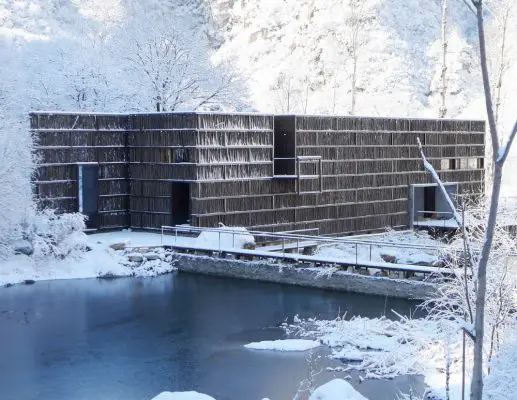
The Prize, which was established in 2014 by Canadian architect Raymond Moriyama along with the RAIC and the RAIC Foundation, consists of a monetary award of CAD $100,000 and a handcrafted sculpture designed by Canadian designer Wei Yew. The Prize celebrates a single work of architecture that is judged to be transformative within its societal context and reflects Moriyama’s conviction that great architecture transforms society by promoting social justice and humanistic values of respect and inclusiveness.
The Moriyama RAIC International Prize, designed by Wei Yew:

The Prize, awarded every two years, is open to all architects, irrespective of nationality and location. Any architect, team of architects, or architect-led collaboration is invited to submit a building or a related group of buildings that has been completed, occupied and in use for at least two years prior to the entry deadline. Candidates are limited to a single submission per award cycle.
The winner is selected in an open, juried competition. An international jury of experts will consider a range of criteria in the evaluation of submissions and intends to include site visits to shortlisted projects in the search for a work of architecture that is inspired as well as inspiring.
Liyuan Library, Jiaojiehe, China by Li Xiaodong:

In 2014, the inaugural winner of the Moriyama RAIC International Prize was Li Xiaodong, of China.
“Winning this award has brought me honor, international recognition and greater credibility and support for my approach to architecture,” says Li, who will sit on the 2017 jury.
“It’s a very important Prize for me because it encourages meaningful ideas and is one of the few international Prizes that sends jury members to visit the finalist buildings,” says Li. “The definition of the Prize is also very special: how one single project can contribute to the human environment. The architectural culture of Canada is positive and eager to make a difference,” he adds. “I’m excited to take part in the jury and thank the RAIC for this opportunity.”
Liyuan Library, Jiaojiehe, China by Li Xiaodong:
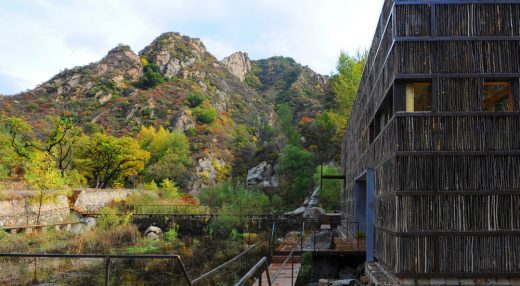
The members of the 2017 Moriyama RAIC International Prize jury are:
• Monica Adair, MRAIC: Co-founder of Acre Architects and 2015 Recipient of the RAIC Young Architect Award.
• Manon Asselin, MRAIC: Co-founder of Atelier TAG and Associate Professor of Architecture at the University of Montreal.
• Bryan Avery, MBE: Founder of Avery Associates Architects, London, England, author and lecturer.
• George Baird, FRAIC: Founding Principal of Baird Sampson Neuert Architects, Former Dean of the John H. Daniels Faculty of Architecture, Landscape, and Design at the University of Toronto, and Recipient of the 2010 RAIC Gold Medal.
• Peter Cardew, FRAIC: Founder of Peter Cardew Architects, and Recipient of the 2012 RAIC Gold Medal.
• Barry Johns, FRAIC: Jury chair, Chancellor of the College of Fellows.
• Li Xiaodong: Winner of the inaugural Moriyama RAIC International Prize.
Logo, 2017 Moriyama RAIC International Prize:
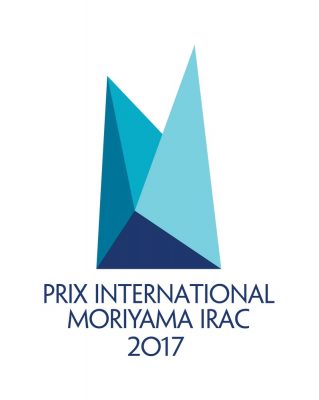
David Covo, FRAIC, Associate Professor of Architecture at McGill University, will act as the Professional Advisor to the jury.
RAIC is also pleased to announce that the 2017 Moriyama RAIC International Prize winner will be invited to participate in the following edition’s jury, thus establishing a link between participants, winners and jurors.
All submissions are due by March 8, 2017. The winner of the 2017 Prize will be announced on September 19, 2017 at a gala event in Toronto at The Carlu, an historic event space in Toronto and one of the city’s best examples of Art Moderne architecture.
“The inaugural Moriyama RAIC International Prize was a great success,” says Raymond Moriyama. “For this next cycle, we hope the Prize will attract an even greater number of outstanding submissions from architects and firms, nationally and worldwide. I look forward to an innovative, transformative architecture to not only win the Prize but awaken ideas and thoughts that will alter our collective aspiration for the future of humanity.”
Barry Johns, trustee of the RAIC Foundation, comments, “The RAIC is grateful to Raymond Moriyama for his vision and his courage in establishing this Prize with RAIC; and we are extremely grateful for the significant financial commitments he has made to ensure the longevity of this award and its growing significance for RAIC, for the profession of architecture and for Canada.”
Detail, Liyuan Library, Jiaojiehe, China by Li Xiaodong:
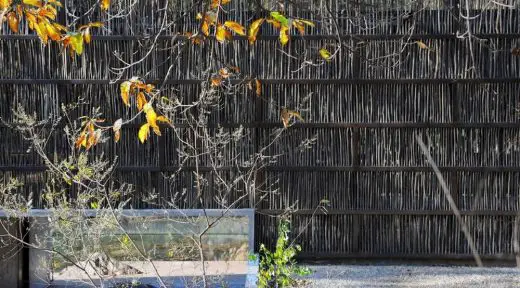
“The RAIC wishes to see and celebrate work that embodies values that arise from the Canadian experience,” notes RAIC 2016 President Allan Teramura, FRAIC “We believe that the conversation about architecture in Canada needs to include what our peers are doing around the globe. This Prize is particularly important to us in Canada because we wish to be there when the best architecture is discussed, wherever it might have been constructed.”
In addition to the main CAD $100,000 Prize, three students of Canadian schools of architecture will each receive scholarships of CAD $5,000. They will be chosen on the basis of a written essay.
For more information on the 2017 Moriyama RAIC International Prize and how to submit your application, please visit: http://moriyama.raic.org/.
All images Courtesy of RAIC.
2017 Moriyama RAIC International Prize information / images received from UED Magazine
Moriyama RAIC International Prize
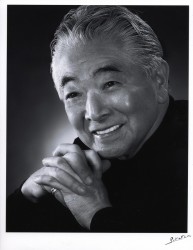
Prize details: http://www.raic.org/moriyamaprize
Moriyama’s biography: http://www.thecanadianencyclopedia.com/en/article/raymond-moriyama/
Location:Canada
Architecture Competitions
Ocean Platform Prison Competition – [AC-CA] Architecture Contest

picture from design competition organisers
Ocean Platform Prison Architecture Competition
Russian Architecture Competition, Russia
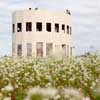
image from competition organisers
Nikola-Lenivets Architecture Competition
Triumph Pavilion Architecture Competition, London, UK
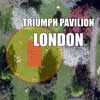
image from competition organisers
Triumph Pavilion Architecture Competitions
Cambridgeshire Design Competition, UK

photo from RIBA Competitions
Great Fen Visitor Centre Architecture Competition
San Pardo Architecture Competition, Matera, Italy
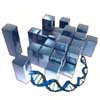
image from design contest organisers
Nemesis Group Architecture Competition
Article 25 Research Architecture Competition, Haiti
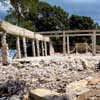
photo by Wayne Rowe, © outreach-international.org
Article 25 Research Architecture Competition
Comments / photos for the 2017 Moriyama RAIC International Prize winner page welcome
2017 Moriyama RAIC International Prize

